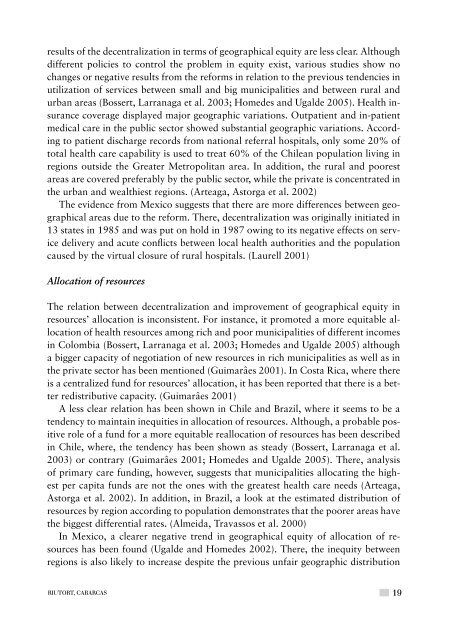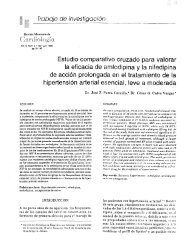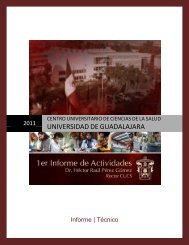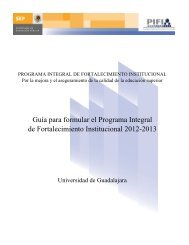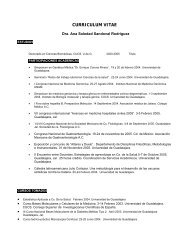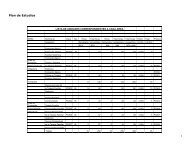Desigualdad Social y Equidad en Salud: Perspectivas Internacionales
Desigualdad Social y Equidad en Salud: Perspectivas Internacionales
Desigualdad Social y Equidad en Salud: Perspectivas Internacionales
- No tags were found...
Create successful ePaper yourself
Turn your PDF publications into a flip-book with our unique Google optimized e-Paper software.
esults of the dec<strong>en</strong>tralization in terms of geographical equity are less clear. Althoughdiffer<strong>en</strong>t policies to control the problem in equity exist, various studies show nochanges or negative results from the reforms in relation to the previous t<strong>en</strong>d<strong>en</strong>cies inutilization of services betwe<strong>en</strong> small and big municipalities and betwe<strong>en</strong> rural andurban areas (Bossert, Larranaga et al. 2003; Homedes and Ugalde 2005). Health insurancecoverage displayed major geographic variations. Outpati<strong>en</strong>t and in-pati<strong>en</strong>tmedical care in the public sector showed substantial geographic variations. Accordingto pati<strong>en</strong>t discharge records from national referral hospitals, only some 20% oftotal health care capability is used to treat 60% of the Chilean population living inregions outside the Greater Metropolitan area. In addition, the rural and poorestareas are covered preferably by the public sector, while the private is conc<strong>en</strong>trated inthe urban and wealthiest regions. (Arteaga, Astorga et al. 2002)The evid<strong>en</strong>ce from Mexico suggests that there are more differ<strong>en</strong>ces betwe<strong>en</strong> geographicalareas due to the reform. There, dec<strong>en</strong>tralization was originally initiated in13 states in 1985 and was put on hold in 1987 owing to its negative effects on servicedelivery and acute conflicts betwe<strong>en</strong> local health authorities and the populationcaused by the virtual closure of rural hospitals. (Laurell 2001)Allocation of resourcesThe relation betwe<strong>en</strong> dec<strong>en</strong>tralization and improvem<strong>en</strong>t of geographical equity inresources’ allocation is inconsist<strong>en</strong>t. For instance, it promoted a more equitable allocationof health resources among rich and poor municipalities of differ<strong>en</strong>t incomesin Colombia (Bossert, Larranaga et al. 2003; Homedes and Ugalde 2005) althougha bigger capacity of negotiation of new resources in rich municipalities as well as inthe private sector has be<strong>en</strong> m<strong>en</strong>tioned (Guimarâes 2001). In Costa Rica, where thereis a c<strong>en</strong>tralized fund for resources’ allocation, it has be<strong>en</strong> reported that there is a betterredistributive capacity. (Guimarâes 2001)A less clear relation has be<strong>en</strong> shown in Chile and Brazil, where it seems to be at<strong>en</strong>d<strong>en</strong>cy to maintain inequities in allocation of resources. Although, a probable positiverole of a fund for a more equitable reallocation of resources has be<strong>en</strong> describedin Chile, where, the t<strong>en</strong>d<strong>en</strong>cy has be<strong>en</strong> shown as steady (Bossert, Larranaga et al.2003) or contrary (Guimarâes 2001; Homedes and Ugalde 2005). There, analysisof primary care funding, however, suggests that municipalities allocating the highestper capita funds are not the ones with the greatest health care needs (Arteaga,Astorga et al. 2002). In addition, in Brazil, a look at the estimated distribution ofresources by region according to population demonstrates that the poorer areas havethe biggest differ<strong>en</strong>tial rates. (Almeida, Travassos et al. 2000)In Mexico, a clearer negative tr<strong>en</strong>d in geographical equity of allocation of resourceshas be<strong>en</strong> found (Ugalde and Homedes 2002). There, the inequity betwe<strong>en</strong>regions is also likely to increase despite the previous unfair geographic distributionRiutort, Cabarcas19


